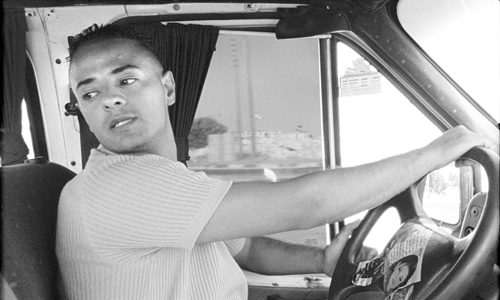A dogma-free look at the Palestinian-Israeli border face-off
The annual New York Film Critics Circle survey at the renamed Museum of the Moving Image in Astoria dependably yields a showering of cinematic treats, but there’s a gem nestled in this year’s edition that would be all too easy to miss.
Screening only on Sunday, February 6, the superb documentary “Ford Transit” is a high-spirited, tenderly observed portrait of Palestinian everyday life in the West Bank, filmed from one of the gypsy fleet of Ford minivans—decommissioned Israeli police transports—that Palestinians depend on to shuttle between ubiquitous checkpoints where other vehicles are stalled for hours. Initially balanced between a profile of the Ford’s young, charismatic driver Rajai and vox-pop encounters with his often uproariously outspoken passengers, the film folds in staged interviews with an assortment of “experts” and keeps shifting gears, finding something surprising around each roadblock.
Nazareth-based director Hany Abu-Assad is better known for his fictional “Rana’s Wedding,” and his gifts for story structure and narrative pleasure elevate “Ford Transit” above many other documentaries about the Occupied Territories. Thanks to Dutch co-financing, “Ford Transit” looks like a million euros, graced with sun-swept 35mm cinematography, and sounds even better, its sound track pulsing with infectious Arab pop and Ennio Morricone’s celebrated scores from the spaghetti westerns “A Fistful of Dollars” and “For a Few Dollars More,” ironically counterpointing the lawless frontier mentality that fuels the conflict.
Abu-Assad discovers a classic leading man in Rajai, whom he originally hired on the production crew of “Rana’s Wedding.” Adventurous––“I hate routine… and I’m afraid of no one”––poised under adversity and marquee-idol beautiful, Rajai is also his own most trenchant observer. Asked why he became a Ford driver, he neatly replies, “One of my ambitions was to be a musician in the Egypt opera. When you can’t fulfill your ambitions you have two choices––either reassess your ambition or become a bitter man.” On the side, Rajai dabbles rather innocently in bootleg compact discs, chiding the Dutch cameraman not to shoot––he keeps rolling––as he ner-vously totes the odd carton to and fro.
Rajai also gallantly goes the extra mile for his passengers when need arises. Paid a flat 20 shekels (for a few dollars more, indeed), he not only drives an elderly, wheelchair-bound man from home to a checkpoint, but escorts him well beyond, through a long, arduous security zone, enlisting burly pedestrians to help hoist the wheelchair over clustered concrete barriers, and ensuring that his charge can continue safely on before returning to the Ford.
Cinephile bait: on Sunday the museum screens the original “festival” version of “Ford Transit” that includes the Dr. Dre recording “Big Egos,” heard to mesmerizing effect during this sequence but dropped from the Sundance Channel’s recent telecast of the film.
“Ford Transit” confounds expectations on many levels, and at least for American viewers opens a very different window onto ordinary Palestinian lives than what is routinely represented in the U.S. media. From face-painted tykes to weathered crones and everyone in between, Rajai’s passengers are demotic, salty and thoroughly unflappable, cheerfully lambasting politicos of all stripes when prompted but more immediately concerned with getting to their jobs or home before curfew. Abu-Assad’s aversion to dogma is crystallized in a scene of Rajai at home in a Ramallah refugee camp, sitting with his family in their humble living room while on TV a report on a Hamas suicide bombing cuts away to the teenage bomber’s hollow, pathetic “farewell video.”
Maintaining a buoyant momentum throughout, Abu-Assad dramatically shifts the tone toward the end, when misfortunes start to multiply after a ride with Gassan Khatib, the Palestinian Authority labor minister who’s anxious to get home before a surprise curfew; his blustery backseat rhetoric is silenced at the next roadblock, where he is humiliated at rifle-point as his connecting Ford waits just beyond. Rajai’s previously cool exchanges with Israeli defense troops turn abruptly uglier, wise-guy thugs keep him from taking fares at one passenger hub and when gunfire finally erupts, you realize these troubles never disappeared—Abu-Assad was only edging them out of the frame to reintroduce them with heightened impact.
Old man Arafat’s passing late last year and his replacement by the moderate Abu Mazen heralds a crucible—of great opportunity and still greater risk—for the Israeli-Palestinian conflict. As unassuming as it is accomplished, “Ford Transit” clears away any cynicism or indifference you might harbor about the urgency of this conflict’s just, peaceful resolution.
gaycitynews.com



































